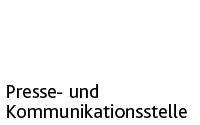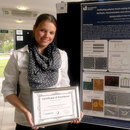A poster full of chemistry
Doctoral student Stephanie Müller has won the "Best Poster Award" in Australia for her research work in which she explains complex processes on a poster.
It packs a lot of physical chemistry into a small space. Whereas a dissertation covers hundreds of pages, Stephanie Müller had to summarise things rather briefly to present her research work. The doctoral student of the University of Siegen summarised complex chemical processes on a poster. And she did it so well that she won the "Best Poster Award in Micro/Nanoengineering" at the "2014 Annual Conference of the Australasian Society for Biomaterials and Tissue Engineering (ASBTE)" in Lorne/Australia.
Stephanie Müller's work on the manufacturing of aluminium-oxide nanostructures, their coatings with protein-resistant polymer brushes and the examinations of cell adhesion on these nanoporous substrates impressed the jury so much that one of the two poster prizes of the international conference went to Siegen this year. The distinction was accompanied by 1,000 dollars of prize money. Stephanie Müller can redeem this at all research establishments of the Australian National Fabrication Facility (ANFF).
Stephanie Müller is working in Physical Chemistry I on her dissertation with Prof. Holger Schönherr at the University of Siegen. In autumn 2014, she will be continuing her research work in Australia and will be researching for two more months in the group of Prof. Nico Voelcker at the Mawson Institute in Adelaide (University of South Australia). Here she will be cooperating in the framework of the recently started joint project "Optical Biosensors for Wound-Colonising Bacteria" in the study groups of Schönherr (Siegen) and Voelcker (Adelaide).
In this project, optical sensors based on silicon and aluminium oxide nanostructures are being developed that are intended to allow a simple diagnosis of infections. The outstanding research results of Stephanie Müller, which have now been awarded the poster prize, form the foundation for this promising project.


